|
|
|
 |
|
 |
| |
book
series
|
Elgar
Intellectual Property and Global Development Series
Rapid global economic integration and the increasing importance of technology and information goods have created the need for a broader, deeper and more critical understanding of intellectual property laws and policies.
This uniquely-designed book series provides an interdisciplinary forum for advancing the debate on the global intellectual property system and related issues that intersect with transnational politics, international
governance, and global economic, social, cultural and technological development.
The series features the works of established experts and emerging voices in the academy as well as those practising on the frontlines.
The series' high-quality, informed and accessible volumes include a wide range of materials such as historical narratives, theoretical explanations, substantive discussions, critical evaluations, empirical analyses, comparative studies, and formulations of practical solutions and best practices.
The series will appeal to academics, policy makers, judges, practitioners, transnational lawyers and civil society groups as well as
students of law, politics, culture, political economy, international relations and development studies.
|
|
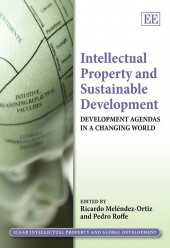
|
Intellectual Property
and Sustainable Development: Development Agendas in a Changing World
Edited by
Ricardo
Meléndez-Ortiz, International Centre for Trade and Sustainable
Development
Pedro Roffe, International Centre for Trade and Sustainable
Development
Intellectual
property has gained an unprecedented importance
in the new world of globalization and the knowledge
economy. However, experience, as well as cyclical
attitudes toward IP, show that there is no universal
model of IP protection.
This comprehensive book considers new and emerging IP
issues from a development perspective, examining
recent trends and developments in this area.
Presenting an overview of the IP landscape in general,
the contributing authors subsequently narrow their
focus, providing wide-ranging case studies from
countries across Africa, Asia and Latin America on
topical issues in the current IP discourse. These
include the impact of IP on the pharmaceutical sector,
the protection of life forms and traditional
knowledge, geographical indications, access to
knowledge and public research institutes, and the role
of competition policy. The challenges developing
countries face in the TRIPS-Plus world are also
explored in detail..
More
information is available at ICTSD's website.
|
|
|
|
|
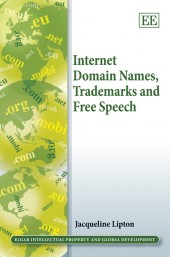
|
Internet
Domain Names, Trademarks and Free Speech
Jacqueline
Lipton, Case Western Reserve University School of Law
As the first form of truly rivalrous digital property,
Internet domain names raise many challenges for law
and policy makers. Analyzing the ways in which past
disputes have been decided by courts and arbitrators,
Jacqueline Lipton offers a comprehensive, global
examination of the legal, regulatory and policy issues
that will shape the future of Internet domain name
governance.
This comprehensive examination of domain name disputes
involving personal names and political and cultural
issues sheds light on the need to balance trademark
policy, free speech and other pressing interests such
as privacy and personality rights. The author stresses
that because domain names can only be registered to
one person at a time, they create problems of scarcity
not raised by other forms of digital assets. Also
discussed are the kinds of conflicts over domain names
that are not effectively addressed by existing
regulations, as well as possible regulatory reforms.
|
|
|
|
|
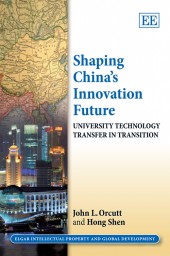
|
Shaping
China's Innovation Future: University Technology
Transfer in Transition
John
L. Orcutt, Franklin Pierce Center for Intellectual Property,
University of New Hampshire School of Law
Shen Hong, Longan Law Firm, Beijing, China
Since
the 1980s, China has worked to develop the technology
commercialization capacity of its universities.
Progress has occurred, but university technology
commercialization remains on the periphery of Chinese
economic development. Because university technology
commercialization is predominantly a 'law-based'
strategy, the authors examine whether China's legal
system adequately supports such efforts. Since the law
does not operate in isolation, the authors conduct
their analysis through the lens of China's overall
innovation system. This holistic approach enables the
authors first to provide a more accurate analysis of
the Chinese legal system's ability to support
university technology commercialization and also to
generate useful insights on the strengths, weaknesses
and future of the country's commercialization
efforts.
One of the problems with analyzing inherently complex
systems – like that of China's innovation system
– is the need for expertise from a very broad range
of disciplines. In that vein, Shaping China's
Innovation Future employs a thorough analysis of a
combination of factors including: the role of law and
China's legal system; economic theory and the
development of China's economy; China's
educational, intellectual property, and financial
systems; China's innovation capacity; and Chinese
culture. Though the recommendations on how to improve
China's technology commercialization system are
unique for China, the scope of the research makes the
conclusions found here applicable to other countries
facing similar challenges.
|
|
|
|
|
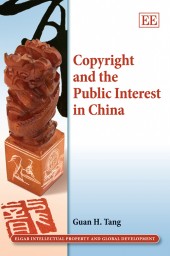
|
Copyright and
the Public Interest in China
Tang
Guan Hong, Shanghai University of Finance and Economics, China
This book expertly highlights how the
multidimensional concept of public interest has
influenced the development and limitations of Chinese
copyright.
Since 1990 China has awarded copyright – individual
rights – but also provides for public, non-criminal
enforcement. The author reveals that pressures of
development, globalisation and participation in a
world economy have hastened the loss of public
interest from copyright. However, for a socialist
country, placing the common ahead of the individual
interest, the public interest also constitutes a
phenomenological tool with which to limit copyright.
The author also discusses how the rise of the
Internet, which has had a major social and economic
impact on China, raises problems for Chinese copyright
law. Comparing Chinese copyright law with the USA and
the UK, topical issues are presented in this unique
book including those arising within education, library
and archives sectors.
|
|
|
|
|
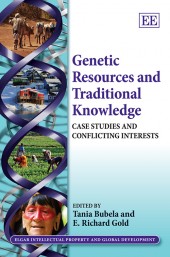
|
Genetic
Resources and Traditional Knowledge: Case Studies and
Conflicting Interests
Edited by
Tania Bubela, University of Alberta, Canada
E. Richard Gold, McGill
University, Canada
This fascinating study describes efforts to define and
protect traditional knowledge and the associated
issues of access to genetic resources, from the
negotiation of the Convention on Biological Diversity
to The Declaration on the Rights of Indigenous Peoples
and the Nagoya Protocol. Drawing on the expertise of
local specialists from around the globe, the chapters
judiciously mix theory and empirical evidence to
provide a deep and convincing understanding of
traditional knowledge, innovation, access to genetic
resources, and benefit sharing.
Because traditional knowledge was understood in early
negotiations to be subject to a property rights
framework, these often became bogged down due to
differing views on the rights involved. New models,
developed around the notion of distributive justice
and self-determination, are now gaining favor. This
book suggests – through a discussion of theory and
contemporary case studies from Brazil, India, Kenya
and Canada – that a focus on distributive justice
best advances the interests of indigenous peoples
while also fostering scientific innovation in both
developed and developing countries.
|
|
|
|
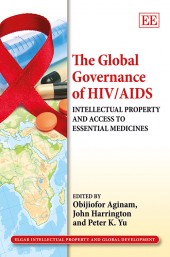
|
The
Global Governance of HIV/AIDS: Intellectual Property
and Access to Essential Medicines Edited by
Obijiofor
Aginam, International Institute for Global Health, United Nations University
John Harrington, University of
Liverpool, United Kingdom
Peter K. Yu, Drake University Law School
This important book brings together leading scholars
from multiple disciplines, including intellectual
property, human rights, public health, and development
studies, as well as activists to critically reflect on
the global health governance regime.
The Global Governance of HIV/AIDS explores the
implications of high international intellectual
property standards for access to essential medicines
in developing countries. With a focus on HIV/AIDS
governance, the volume provides a timely analysis of
the international legal and political landscape, the
relationship between human rights and intellectual
property, and emerging issues in global health policy.
It concludes with concrete strategies on how to
improve access to HIV/AIDS medicines.
|
|
|
|
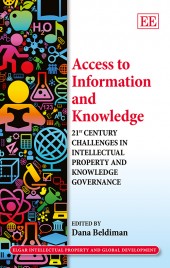
|
Access
to Information
and Knowledge:
21st Century Challenges in Intellectual Property and Knowledge Governance
Edited by Dana Beldiman, Bucerius Law School, Germany and University of California, Hastings College of
Law
Massive
quantities of information are required to fuel the innovation
process in a knowledge-based economy; a requirement that is in
tension with intellectual property laws. Against this
backdrop, leading thinkers in the IP arena explore the 'access
challenge' of the 21st century, framed as the tension between
the interest in the free flow of information and the fragmentation
of knowledge resulting from strong IP laws.
In some areas this tension seems to resolve in a shift of IP laws
in the direction of greater openness, whether due to new business
models, improved legal tools or access-friendly interpretations of
existing laws. The book's chapters explore the challenges
encountered by this 'opening' process from various
perspectives, including open access to public sector and
scientific research data; enhanced use of licensing; reshaping the
contours of individual IP laws; inclusion of new stakeholders in
the IP debate; and challenges to the information flow in the
international arena.
|
|
|
|

|
Trademark Protection
and Territoriality Challenges in a Global Economy
Edited by
Irene Calboli, Marquette University Law School
Edward Lee, Chicago-Kent College of Law, Illinois Institute of Technology
As
the modern business world becomes increasingly decentralized and
globally focused, traditional interpretations and applications of
trademark protection law are facing greater and greater
challenges. This is particularly true regarding the principle of
trademark territoriality, which holds that trademark rights are
bound by the laws of individual nations. This timely volume offers
expert analyses of the challenges facing crucial aspects of
trademark law from some of the most prominent scholars in the
field.
The contributors explore how the rise of international trade and
globalization has changed the way trademark law functions in a
number of important areas, including protection of well-known
marks, parallel imports, enforcement of trademark rights against
counterfeiting, remedies, protection of certification marks, and
domain names. A detailed discussion of the history of trademarks
and territoriality along with a comprehensive breakdown of current
issues make this a complete and well-rounded resource for the
study of trademark law in a contemporary context.
|
|
|
|
 |
Governance of Intellectual Property Rights in China and
Europe
Edited by
Nari Lee,
Hanken School of Economics, Helsinki, Finland
Niklas
Bruun,
Hanken School of Economics, Helsinki, Finland
Li Mingde, Chinese Academy of Social Sciences, China
Intellectual property law performs a number of complex functions in society. To foster innovation and creativity in a society, governments are actively using intellectual property law as a means of governance. Both in China and in Europe, intellectual property law is used to further innovation and cultural policies to increase national competitiveness in a global economy.
Due to its impact on global trade, intellectual property laws are increasingly made and influenced by international norms. Against the backdrop of this dynamic global intellectual property norm competition and interaction, this book explores governance of intellectual property rights in China and Europe. This book examines and compares the series of intellectual property law and system reforms in China and Europe. Through the analysis, this book argues that a successful governance of intellectual property rights require not only the adoption of a set of norms but also transformation of the perspectives and the implementing
institutions
|
|
|
|
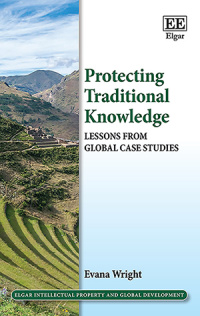
|
Protecting Traditional
Knowledge: Lessons from Global Case Studies
Evana Wright, University of Technology Sydney, Australia
Protecting Traditional Knowledge examines the emerging international frameworks for the protection of Indigenous traditional knowledge, and presents an analysis situated at the intersection between intellectual property, access and benefit sharing, and Indigenous peoples’ rights to self-determination.
Drawing on the experience of India and Peru, the author identifies lessons that may be used by Indigenous and local communities in making decisions regarding the protection of traditional knowledge. Using these two key case studies, the book argues that a sui generis regime based on principles of self-determination, prior informed consent and mutually agreed terms may empower Indigenous and local communities and act as a form of corrective justice.
|
|
|
|
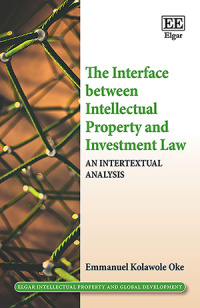
|
The Interface
Between Intellectual Property and Investment Law: An Intertextual Analysis
Emmanuel Kolawole
Oke, University of Edinburgh, United Kingdom
This original book presents a critical analysis of the interface between international intellectual property law and international investment law through the lens of intertextuality. It argues that a structuralist approach to intertextuality can be useful in the context of legal interpretation, especially in relation to the interpretation of treaties.
Emmanuel Kolawole Oke critically evaluates the assumption that investment tribunals cannot take the rules of international intellectual property law into account when resolving investment disputes concerning intellectual property rights. He demonstrates instead the ways in which investment tribunals can and should adopt an intertextual approach when resolving such disputes, which, in turn, will help to preserve the intellectual property policy space of host states.
|
|
|
|
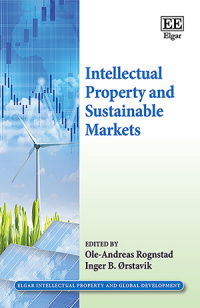
|
Intellectual Property and Sustainable Markets
Edited
by
Ole-Andreas Rognstad, University of Oslo, Norway
Inger B. Ørstavik, University of Oslo, Norway
Discussing how intellectual property
rights play a role in tackling the challenge of securing sustainable development, renowned scholars consider how the core objective of
IP rights to promote innovation and development of new knowledge aligns with the UN Sustainable Development Goals (SDGs). This authoritative book provides an in-depth analysis of the multi-faceted interface between this core objective and the
SDGs.
Chapters analyse selected interrelations between
IP law and other areas of law, including energy and financial law. Contributors explore the dimension of social development through timely examples such as the global solar photovoltaic market, the trend towards reusing and recycling, and the digital distribution of news services. This thought-provoking book argues for sustainable markets as an overreaching and contextual approach to the role of
IP rights in tackling the challenges of the UN SDGs.
|
|
|
|
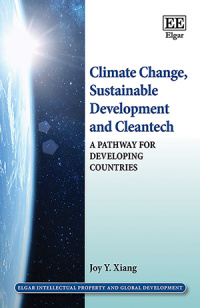 |
Climate Change, Sustainable Development and
Cleantech: A Pathway for Developing Countries
Joy Y.
Xiang, Peking University School of Transnational Law, China
Climate Change, Sustainable Development and Cleantech envisions both global cleantech development and international cleantech transfer as crucial means to address climate change and secure sustainable development for planet earth. The book examines what it takes to attract foreign cleantech and encourage domestic cleantech innovation. The author proposes a pathway for developing countries that includes international aid, mutually beneficial international cleantech cooperation and domestic cleantech innovation.
Prior to becoming an academician, the author garnered over eighteen years practical experience as a software engineer and attorney at law. The author has drawn on this experience to examine empirical analysis of factual data such as global R&D data, global patenting data, international surveys concerning cleantech transfer and domestic cleantech innovation and proposes effective solutions to address climate change and achieve sustainable development.
|
|
|
|
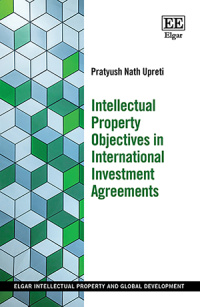 |
Intellectual Property Objectives in International Investment Agreements
Pratyush Nath
Upreti, School of Law, Queen's University Belfast, United Kingdom
This timely book reconciles the competing objectives of intellectual property and international investment agreements. Throughout, Pratyush Nath Upreti examines the issues arising from recent intellectual property disputes in investment arbitration from the perspectives of national and international legal orders, providing a normative analysis to resolve the tension brought by intellectual property and investor-state dispute settlement interactions. The analysis that the book offers is not confined to the intellectual property regime; it takes a pragmatic approach in terms of substantial analysis by also exploring the international trade regime, investment law and arbitration to address the key challenges to intellectual property and investor-state dispute settlement interaction. The author also considers the emerging and potential transformation of international intellectual property law, putting more emphasis on the need to shelter its intrinsic value.
|
|
|
|
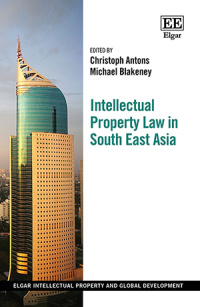 |
Intellectual Property Law in South East Asia
Edited
by
Christoph
Antons, Macquarie Law School, Macquarie University, Australia
Michael
Blakeney, University of Western Australia Law School, Australia
This timely book provides a comprehensive survey of recent developments in intellectual property (IP) law within the Association of Southeast Asian Nations (ASEAN) countries, written by experienced scholars and practitioners in the field. Divided into three insightful parts, the book looks into recent IP developments in individual countries, examining the relationship of ASEAN as a group with the wider region in IP matters, as well as providing comparative studies of copyright infringements, IP in agriculture, IP enforcement and pharmaceutical patenting in the ASEAN countries. Chapters investigate further pressing topics such as IP related to the innovation economy, covering all countries of ASEAN, recently concluded bi- and multilateral agreements and ASEAN IP negotiations with China and other trading partners.
|
|
|
|
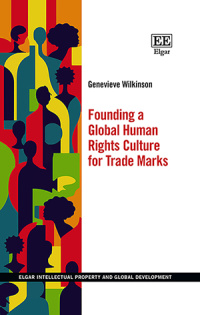 |
Founding a Global Human Rights Culture for Trade Marks
Genevieve Wilkinson, Faculty of Law, University of Technology
Sydney, Australia
This ground-breaking book demonstrates that states are not attentive enough to the serious human rights implications of trade mark protection. Important rights to freedom of expression, health, life, benefits from science and culture, privacy, a fair trial and protection from discrimination and hate speech are often insufficiently addressed. The book develops an original approach that enables policy-makers to realise these rights, advocating for the development of a global human rights culture for trade marks. Using diverse examples from Australia, Uruguay, Europe, the United States and Kenya, Genevieve Wilkinson explores how trade mark protection can both promote and restrict human rights. Focusing on three detailed case studies – tobacco plain packaging, anti-counterfeiting measures and contrary marks – the book translates emerging human rights frameworks for health into a human rights framework for trade marks. It calls for greater attention to how trade marks can impact economic, social and cultural rights and proposes new ways to detect counterfeit trade marked goods.
|
|
|
|
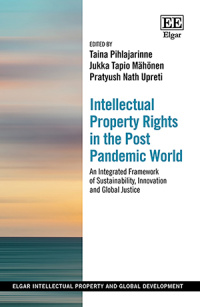 |
Intellectual Property Rights in the Post Pandemic
World: An Integrated Framework of Sustainability, Innovation and Global Justice
Edited
by
Taina
Pihlajarinne, University of Helsinki, Finland
Jukka Mähönen, University of
Helsinki, Finland and University of Oslo, Norway
Pratyush Nath
Upreti, School of Law, Queen's University Belfast, United Kingdom
The drastic impact of the COVID-19 pandemic highlighted many of society’s systemic inequalities. This timely and prescient book explores the role that Intellectual Property Rights (IPRs) played in the pandemic and argues for developing a framework of sustainability, innovation, and global justice in IPR systems, to build a more globally sustainable regime. IPRs impact products and processes which address fundamental societal needs, yet innovation is largely incentivised by the granting of exclusive rights which can limit accessibility to new products and technologies. In light of the COVID-19 pandemic,
Intellectual Property Rights in the Post Pandemic World adopts a cross-disciplinary approach to analyse the relationship between IPRs, sustainability, innovation and the circular economy. Chapters examine pressing issues concerning responding to crises, inventions, the circular economy, follow-on innovation and multi-stakeholder collaboration, among others, as possible ways to finance sustainability. Throughout, this book focuses on how the IP system was challenged by the events of the pandemic, with a view to understanding how IPRs can be used to promote progressive social and sustainable innovation in the future.
|
|
|
|
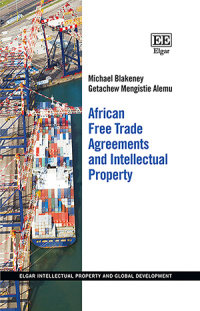 |
African Free Trade Agreements and Intellectual Property
Michael
Blakeney, University of Western Australia Law School, Australia
Getachew Mengistie Alemu, Intellectual Property
Consultant, Maryland
This informative book examines the intellectual property (IP) provisions of the sub-regional, continental and international Free Trade Agreements (FTAs) that have been implemented by African countries to facilitate trade and promote economic integration. Michael Blakeney and Getachew Mengistie Alemu explain how FTAs can be used when setting IP standards in order to influence the ongoing effort to develop effective international agreements with Africa.
African Free Trade Agreements and Intellectual Property details the national, sub-regional and continental structure of African IP laws and their relationship to the FTAs entered into by African states and sub-regional groupings. The book explores a broad range of topics including the socio-economic challenges of African countries, the African continental IP arrangements, Agenda 2063, cultural and biodiversity legislation. Looking ahead, the book recommends using IP to better support African countries in relation to biopiracy, access to genetic resources, the equitable sharing of benefits from the exploitation of those resources and the protection of traditional knowledge, cultural expressions and folklore.
|
|
|
|
|
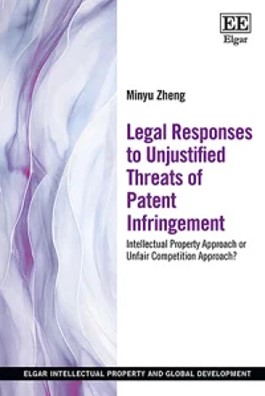
|
Legal Responses to Unjustified Threats of Patent Infringement: Intellectual Property Approach or Unfair Competition Approach?
Zheng
Minyu, Kempinski AG and Max Planck Institute for Innovation and Competition, Munich, Germany
In this incisive book,
Zheng Minyu examines the various legal responses to unjustified threats of patent infringement. Employing a comparative, jurisdiction-based analysis,
she investigates whether the unjustified nature of such threats originates from the inaccuracy of the infringing
accusation or the inappropriateness of issuing threats. In particular,
she reveals how to resolve threats which are issued in an undue way but contain a correct allegation of patent infringement.
The book provides a clear picture of how the legal systems in China, Germany,
the United Kingdom and the United States resolve the common problem of patent infringement threats from various perspectives, including statutes and judicial practice. Comparing these jurisdictions at a micro-level, Zheng assesses the principle of proportionality that assists in the critical evaluation of the approaches used in the investigated legal solutions, namely the intellectual property approach and the unfair competition approach. Ultimately,
she suggests a general rule for dealing with unjustified threats of patent infringement, fitting into the legal framework of the Paris Convention.
|
|
Elgar Law, Technology and Society
Series
The information revolution and the advent of digital technologies have ushered in new technological developments, social practices, business models, legal solutions, regulatory policies, governance structures, communication techniques, consumer preferences, and global concerns. This uniquely-designed book series provides an interdisciplinary forum for studying the complex interactions among law, technology and society. It examines the broader and deeper theoretical questions concerning information law and policy, explores its latest developments and social implications, and seeks to provide new ways of thinking about new media and changing technology.
|
|

|
Copyright Law and the
Progress of Science and the Useful Arts Alina Ng, Mississippi College School of
Law The
American Constitution empowers Congress to enact copyright laws to
'promote the progress of science and the useful arts'. This
book offers the first in-depth analysis of the connection between
copyright law as a legal institution and the constitutional goal
of promoting social and cultural advancement.
Focusing on the relationship between this explicit purpose and the
normative uses and production of creative works, Alina Ng argues
that a robust copyright system that embodies moral and ethical
principles is necessary to protect the different values and
expectations of authors, publishers and users of creative works.
The author demonstrates that a more nuanced understanding of
property rights and statutory privileges, as bearing different
types of entitlements, is critical to the sustainable development
of society and culture at both national and international levels.
She posits that as communication technologies become ubiquitous
and facilitate greater connectivity between authors and their
readers, the notion of authorship as a creative endeavor producing
works with significant influence upon society and culture must
form the central tenet of the copyright system. |
|
|
|
|
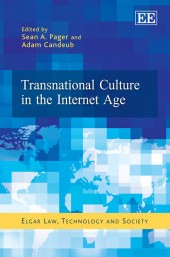
|
Transnational Culture
in the Internet Age
Edited by
Sean A. Pager, Michigan State University College of Law
Adam Candeub, Michigan State University College of Law
Digital
technology has transformed global culture, connecting and
empowering users on a hitherto unknown scale. Existing paradigms
from intellectual property rights to cultural diversity and
telecommunications regulation seem increasingly obsolete,
confounding policymakers and provoking wide-ranging debate.
Transnational Culture in the Internet Age draws on a range of
disciplines to examine new approaches to regulating communications
and cultural production.
The insightful contributions shed new light on insufficiently
examined issues and highlight connections that cut across the many
different domains in which such regulations operate. Building upon
the framework presented by David Post – one of the first and
most prominent scholars of cyber law and a contributor to this
volume – the authors address the implications and economics of
the Internet's astronomical scale, jurisdiction and enforcement
of the web as it relates to topics including libel tourism and
threats to free speech, and the power of global communication to
dissolve and recreate identities.
|
|
|
|
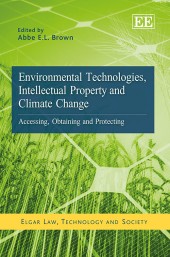 |
Environmental Technologies, Intellectual Property
and Climate Change: Accessing, Obtaining and Protecting
Edited by Abbe E.L. Brown, School of Law, University of Aberdeen, United Kingdom
Many disciplines are relevant to combating climate change. This
challenging book draws together legal, regulatory, geographic,
industrial and professional perspectives and explores the role of
technologies in addressing climate change through mitigation,
adaptation and information gathering. It explores some key issues.
Is intellectual property part of the solution, an obstacle to
change or peripheral? Are there more important questions? Do they
receive the attention they deserve? And from whom? This innovative
book will play an important role in stimulating holistic
discussion and action on an issue of key importance to society.
|
|
|
|
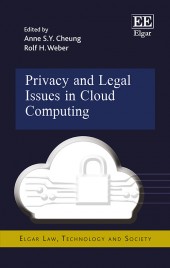
|
Privacy and Legal Issues in Cloud
Computing
Edited by
Anne S.Y. Cheung,
Faculty of Law, University of Hong Kong
Rolf H. Weber,
Faculty of Law, University of Zurich, Switzerland
Using
a multi-disciplinary and comparative approach, this study examines
emerging and innovative attempts to tackle privacy and legal
issues in cloud computing such as personal data privacy, security
and intellectual property protection.
An international team of legal scholars, computer science
researchers, regulators and practitioners present original and
critical responses to the growing challenges posed by cloud
computing. They analyse the specific legal implications pertaining
to jurisdiction, biomedical practice and information ownership, as
well as issues of regulatory control, competition and cross-border
regulation.
|
|
|
|
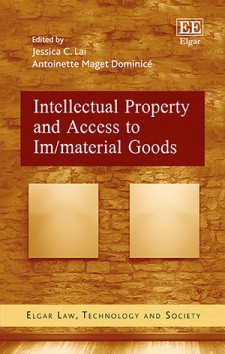 |
Intellectual Property and Access to
Im/material Goods Edited by Jessica C. Lai,
Victoria University of Wellington, New Zealand
Antoinette Maget Dominicé, University of Lucerne,
Switzerland Traditionally, in order to be protected intellectual property goods have almost always needed to be embodied or materialized (and – to a certain extent – to be used and enjoyed), regardless of whether they were copyrighted works, patented inventions or trademarks. This book examines the relationship between intellectual property and its physical embodiments and materializations, with a focus on the issue of access and the challenges of new technologies. Expert contributors explore how these problems can re-shape our theoretical notion of the intangible and the tangible and how this can have serious consequences for access to intellectual property goods.
|
|
|
|
 |
The Legal Challenges of Social
Media
Edited by
David Mangan, City, University of London,
United Kingdom
Lorna E. Gillies, University of Strathclyde,
United Kingdom
Social media offers a platform for individual self-expression and the sharing of information. However, social media issues are boundless, permeating distinct legal disciplines. The law has struggled to adapt and for good reason: how does the law regulate this medium over the public/private law divide? This book engages with the legal implications of social media from both public and private law perspectives and outlines how the law has endeavoured to adapt the existing tools to social
media.
The expert contributors explore a range of ideas to investigate the intersection between law and social media and they provide an insight into the challenges the legal community currently face. This collection explores key topics such as public and private law implications, the gap between the lay and legal understandings of social media, the conflict of laws regarding social media and the individual rights associated with social
media.
|
|
|
|
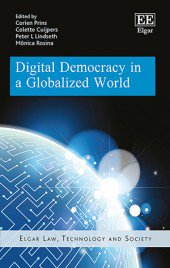
|
Digital Democracy in a Globalized
World
Edited by
Corien Prins, Netherlands Scientific Council for Government Policy
(WRR) and Tilburg Institute for Law, Technology and
Society, The Netherlands
Colette
Cuijpers, Tilburg Institute for Law, Technology and Society and Tilburg Law School,
The Netherlands
Peter L.
Lindseth, University of Connecticut School of
Law
Mônica Rosina, Fundação Getulio Vargas Law School, Brazil
The transformative impacts of digitalization on society are visible both within nation states and across borders. Information and communication technologies are typically considered beneficial for democracy. Nevertheless, this book explores the challenges that technology brings to democracy, and in so doing advances our understanding of this crucial digital, social and political phenomenon. It contributes to the broader discussion of the relationship between international, national and sub-national norms, institutions and actors in an increasingly connected
world.
Insightful and current, this book offers a wide variety of perspectives in an area where there is still not yet an extensive body of research. It considers, for example: the extent to which new forms of digital political engagement change traditional democratic decision-making; how receptive national governments and authorities are to digital democratic movements; how governments can uphold the values of democratic society while also ensuring flexibility with regard to the private sector; and how we should judge these developments in light of the cross-border effects of
digitalization.
|
|
|
|
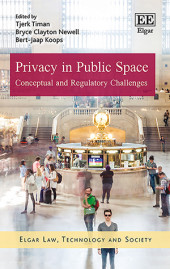
|
Privacy in Public
Space: Conceptual and Regulatory Challenges
Edited by
Tjerk
Timan, Netherlands Organisation for Applied Scientific Research (TNO),
The Netherlands
Bryce Clayton Newell, School of Information Science, University of
Kentucky
Bert-Jaap
Koops, Tilburg Institute for Law, Technology and Society,
The Netherlands
With ongoing technological innovations such as mobile cameras, WiFi tracking, drones, and augmented reality, aspects of
citizens' lives are becoming increasingly vulnerable to intrusion. This book brings together authors from a variety of disciplines (philosophy, law, political science, economics, and media studies) to examine privacy in public space from both legal and regulatory
perspectives.
The contributors explore the contemporary challenges to achieving privacy and anonymity in physical public space at a time when legal protection remains limited in comparison to
'private' space. To address this problem, the book clearly demonstrates why privacy in public space needs defending. Different ways of conceptualizing and shaping such protection are explored, for example through
'privacy bubbles', obfuscation and surveillance transparency, as well as by revising the assumptions underlying current privacy laws.
|
|
|
|
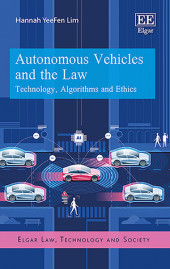
|
Autonomous Vehicles and the
Law: Technology, Algorithms and Ethics
Hannah YeeFen Lim,
Nanyang Technological University, Singapore
Autonomous vehicles have attracted a great deal of attention in the media, however there are some inconsistencies between the perception of autonomous
vehicles' capabilities and their actual functions. This book provides an accessible explanation of how autonomous vehicles function, suggesting appropriate regulatory responses to the existing and emerging
technology.
Hannah YeeFen Lim explores the current capabilities of autonomous vehicles and importantly, highlights their inherent limitations. Lim provides a concise and easy to follow overview of the technology behind autonomous vehicles which encompasses hardware and software aspects, including machine learning algorithms. Having laid the technical foundation, the following chapters assess the current legal standards in negligence law that are applicable to autonomous vehicles taking the current technical limitations of the vehicles into account. Lim concludes by exploring the ethical issues associated with autonomous vehicles and proposes appropriate regulatory approaches.
|
|
|
|
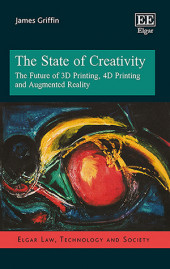
|
The State of
Creativity: The Future of 3D Printing, 4D Printing and Augmented Reality
James Griffin, Law School, University of Exeter,
United Kingdom
Creativity has been integral to the development of the modern State, and yet it is becoming increasingly sidelined, especially as a result of the development of new machinic technologies including 3D printing. Arguing that inner creativity has been endangered by the rise of administrative regulation, James Griffin explores a number of reforms to ensure that upcoming regulations do take creativity into
account.
The State of Creativity
examines how the State has become distanced from individual processes of creativity. This book investigates how the failure to incorporate creativity into administrative regulation is, in fact, adversely impacting the regulation of new technologies such as 3D and 4D printing and augmented reality, by focusing on issues concerning copyright and patents.
|
|
|
|
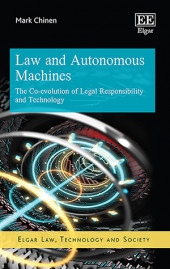
|
Law and Autonomous
Machines: The Co-evolution of Legal Responsibility and Technology
Mark
Chinen, Seattle
University School of Law
This book sets out a possible trajectory for the co-development of legal responsibility on the one hand and artificial intelligence and the machines and systems driven by it on the
other.
As autonomous technologies become more sophisticated it will be harder to attribute harms caused by them to the humans who design or work with them. This will put pressure on legal responsibility and autonomous technologies to co-evolve. Mark Chinen illustrates how these factors strengthen incentives to develop even more advanced systems, which in turn inspire nascent calls to grant legal and moral status to autonomous machines.
|
|
|
|
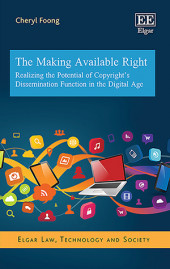 |
The Making Available
Right: Realizing the Potential of Copyright's Dissemination Function in the Digital Age
Cheryl
Foong,
Curtin Law School, Australia
The right of copyright owners to make their content available to the public is crucial in an environment driven by access. The Making Available Right provides in-depth analysis of this exclusive right and offers insights on how we can approach the right in a more transparent and principled
manner.
Cheryl
Foong articulates a conceptual framework for understanding this
right in a dynamic communications environment, critically examines
the similarities and differences in its implementation across the
United States, the European Union and Australia, and draws out
underlying themes that serve as lessons for reform. The author
builds an analytical framework for the making available right that
addresses copyright's underappreciated dissemination function –
i.e. encouraging the dissemination of content to the public – in
conjunction with its authorship function.
|
|
|
|
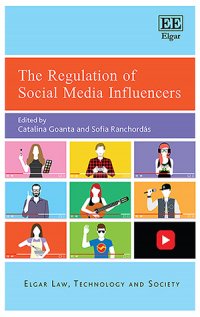
|
The Regulation of Social Media Influencers
Edited by
Catalina
Goanta, Faculty of Law, Maastricht University, The Netherlands
Sofia Ranchordás,
Groningen Law School, The Netherlands
In today’s society, the power of someone’s reputation, or influence, has been turned into a job: that of being a social media influencer. This role comes with promises, such as aspirational work, but is rife with challenges, given the controversy that often surrounds influencers. This is the first book on the regulation of social media influencers, that brings together legal, economic and ethical angles to further unveil the implications of influencer
marketing.
Thus far, influencers have been under scrutiny for not disclosing paid advertising, yet their activity has many more questionable implications. This edited volume combines insights from law, economics, ethics and communication science to reveal these implications and propose new ways in which public bodies, social media companies and citizens ought to relate to influencer marketing.
|
|
|
|
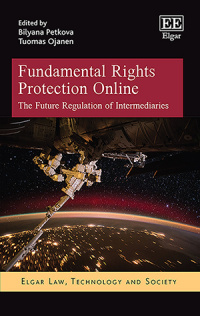
|
Fundamental Rights Protection Online: The Future Regulation of Intermediaries
Edited by
Bilyana
Petkova, University of Graz, Austria
Tuomas
Ojanen, University of Helsinki, Finland
Fundamental Rights Protection Online presents an in-depth analysis of national, supranational and international attempts at online speech regulation, illustrating how the law has been unsettled on how to treat intermediaries.
In this book, expert contributors explore how problems ranging from disinformation to hate speech to copyright violations are framed and tackled though legislation, codes of conduct and judicial interpretation. The chapters discuss positive law developments in the intersection of intermediary liability and rights, considering both the history and current intellectual debates surrounding European and US legislative initiatives. In addition to examining how the European Union and individual European nations regulate speech online, the book also analyses the e-Commerce Directive, the case law of the European Court of Human Rights and principles established under the United Nations. It concludes that content regulation online is best captured by the notion of
"speech curation," involving both private and public actors.
|
|
|
|
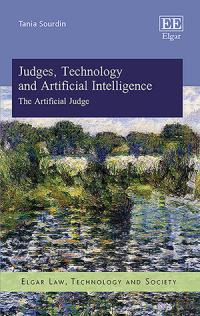
|
Judges, Technology and Artificial Intelligence: The Artificial Judge
Tania
Sourdin, University of Newcastle, Australia
New and emerging technologies are reshaping justice systems and transforming the role of judges. The impacts vary according to how structural reforms take place and how courts adapt case management processes, online dispute resolution systems and justice apps. Significant shifts are also occurring with the development of more sophisticated forms of
artificial intelligence that can support judicial work or even replace judges. These developments, together with shifts towards online court processes are explored in
Judges, Technology and Artificial Intelligence.
By considering how different jurisdictions are approaching current and future technological shifts and in particular by focusing on the different approaches in the US, UK, Australia and China and elsewhere, the author draws a rich comparative exploration of justice technology trends. Judicial commentary is considered as well as the growing scholarly discourse about these trends. Ethical and user centred design options are examined in the context of how responsive judges engage with supportive, replacement and disruptive technologies in courts.
|
|
|
|
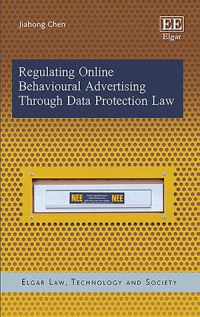
|
Regulating Online Behavioural Advertising Through Data Protection Law Jiahong Chen, University of Sheffield,
United Kingdom
This insightful book provides a timely review of the potential threats of advertising technologies, or adtech. It highlights the need to protect internet users not only from privacy risks, but also as consumers and citizens online dealing with a highly complex technological setting.
Jiahong Chen illustrates a concise overview of the technical, economic and legal aspects of adtech together with coverage of other important areas. These
include the ongoing debates around online advertising and data protection, an up-to-date analysis of the application of the GDPR, and insights into both the practices and theories of the regulation of data protection law. The book provides a clear picture of what is truly at stake with online advertising practices, concluding with a critical assessment of the current regime and a proposed approach to reform data protection laws.
|
|
|
|
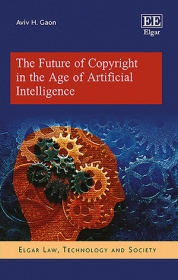
|
The Future of Copyright in the Age of Artificial Intelligence
Aviv H.
Gaon, Harry Radzyner Law School,
Reichman University (IDC Herzliya), Israel
The Future of Copyright in the Age of Artificial Intelligence offers an extensive analysis of intellectual property and authorship theories and explores the possible impact artificial intelligence (AI) might have on those theories. The author makes compelling arguments via the exploration of authorship, ownership and artificial intelligence. First, the book advocates for a more holistic approach to authorship, arguing that there is no good reason to exclude computer-generated and AI creations from copyright. Second, it conducts an open search for the right
"candidate" for ownership. In doing so, the book explores several possible legal frameworks, including assigning ownership to the programmer, the user, the AI itself and other alternatives such as the public domain or author-in-law approaches. Third, the book explores the concept of AI as it has developed through the years in various fields, seeking to reframe the AI legal concept.
|
|
|
|

|
Pandemic Surveillance: Privacy, Security, and Data Ethics Edited
by Margaret Hu, William & Mary Law School, College of William & Mary,
United States
As the COVID-19 pandemic surged in 2020, questions of data privacy, cybersecurity, and the ethics of surveillance technologies centred an international conversation on the benefits and disadvantages of the appropriate uses and expansion of cyber surveillance and data tracking. This timely book examines and answers these important concerns. Pandemic Surveillance frames and defines digital privacy and security in the context of emerging surveillance technologies, providing informed dialogue on international conversations regarding pandemic surveillance. The book examines the challenges of regulating pandemic surveillance technologies across diverse geographical settings, including Europe and Latin America, along with comparative analysis of social credit systems in China and the United States. Margaret Hu and her impressive selection of contributors explore the legal, scientific and ethical challenges in a world with a growing data surveillance architecture, providing policy recommendations and forward-looking solutions, including the importance of ethical frameworks, to minimise potential misuse and abuse of surveillance technologies.
|
|
|
|

|
Novel Beings: Regulatory Approaches for a Future of New Intelligent Life Edited
by David R. Lawrence, Durham Law
School, United Kingdom Sarah Morley, Newcastle Law School,
United Kingdom
Novel Beings is a forward-looking exploration into the divide between proactive and reactive regulatory approaches to the cross-section of biotechnology and artificial intelligence (AI) research. Addressing an innovative area of academic study, Novel Beings questions how this research, which has the potential to create new forms of morally valuable life, could be regulated. This fascinating book examines the promises and perils of conflicting approaches to regulating emerging technologies in the unique context of this probable challenge for law and society. An impressive, and multidisciplinary, selection of expert contributors offer considerations vital to any attempt to address these issues before they become impossible to prevent or rectify. Chapters explore technologies such as genomics, synthetic biology and neurotechnologies, as well the profusion of ‘expert systems’ – algorithms and simple AI that interweave through everyday life, from smart assistants, to the financial markets, to social media. David Lawrence and Sarah Morley also discuss the global challenges for society and the laws regarding the status of these technological beings, their protections and obligations.
|
|
|
|

|
Regulating Social Network Sites: Data Protection, Copyright and Power Asma Vranaki, School of Law, University of Bristol, United Kingdom
Drawing on rich, empirical case studies this innovative book provides a contemporary and comprehensive exploration of the plural, dynamic and precarious processes, materials, practices, interventions and relationships on social network sites, and their resultant power effects, when copyright and data privacy rights are at stake. In pursuit of this objective, chapters develop a cutting-edge conceptual power lens that brings together Actor-Network theory and Foucauldian scholarship on power. Applying this analytical framework to the case studies of Facebook (data protection) and YouTube (copyright), Asma Vranaki draws critical attention to underexplored and novel matters in digital regulation. These matters include resistance; the materiality of regulation; complex, contingent, fragile and dynamic digital ‘regulatory spaces’; the contingency of power; law as a heterogenous ‘assemblage’; the unintended consequence of local orderings; and the links between power and spaces. Ultimately, the author demonstrates that power effects are highly localised, precarious and contingent outcomes of manifold, complex and fluid alliances between diverse humans and non-humans.
|
|
|
|
|

|
The State of Cultural Biology: Regulating Biological Computing James Griffin, School of Law, University of Exeter,
United Kingdom
Offering a novel and pragmatic perspective, this timely book critically examines the development of a culture of machinist regulation and questions whether this approach is appropriate in an era of rising biological technologies. Adopting an ontological approach, James Griffin considers how current regulatory frameworks favour digital technology and how this may change in the future. The
author adeptly investigates how regulation can impact the nature of new technologies, especially as biological computing is becoming more commonplace. Chapters provide a wealth of critical analysis, considering cutting-edge technologies such as AI, prosthesis, and biological computing.
He outlines a proposed reformative system which focuses on the biological substrate in the creation of cultural works. The book serves to highlight the ever-increasing need for awareness of the importance of biological substrates and for a regulatory system which reflects this.
|
|
|
| |
..... ..... |
|
|







































